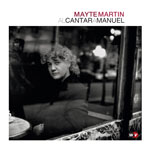In review--Death, the Old Man and The Sea
Alcantara Manuel
World Village
Mixing jazz, Latin American new song and flamenco Spanish guitarist/vocalist Mayte Martin celebrates the poetry of Manuel Alcàntar. The flamenco that appears on Alcantara Manuel could be described as passionate, but more melancholic than fiery. The emphasis appears to be on the text and vocals which are framed by 2 guitars (right and left channels), double-bass, percussion and violins with Martin’s voice caressing each word with soulful emotions. I’m reminded of the late Argentine new song performer Mercedes Sosa who also has the gift of igniting text with her emotive voice. Martin also possesses a powerful and sensitive alto voice. And both performers extract the soulfulness of the Spanish language while employing it as a powerful tool that travels into the hearts of their listeners.
I actually had to research the Spanish prize-winning poet Manuel Alcàntar whose poems featured on this album focus on death, the sea, heartache, war, and childhood innocence. There’s often a boy in a park or a man staring out at the sea. He includes requiems for strangers with sad stories as in the case with Manuel and For Miguel Hernàndez. He also features lonely people that find sustenance in simple things such as the view of the sea as mentioned earlier or jasmines, dolphins and mermaids in Child of the 1940s. His poems remind me of Lorca’s and Neruda’s work which also focused on injustice, cruelty, death, and the beauty of the natural world.
On The Sea Does Not Know it is Sunday, Martin sings, “The sea does not know it is a shipwreck without watch and without friends…” Martin and her fellow-guitarist Josè Luìs Montòn emphasize the emptiness of the text with bell-like strums and a listener can almost hear the waves of ocean lapping against the shoreline on a forlorn Spanish afternoon.
Excuses to Lola features vocals slowly slipping to an edge of a good sob and Martin adapted the poem Manuel to the tune of a tango, which fits perfectly on this album. The Dove of Picasso provides strong visuals for the musicians to wrap around their talents. South Where the Lemons Grow provides space for violinist Olvido Lanza to express melancholy through his instrument of wood and strings. The most beautiful images appear in the song Child of the 1940s which reflects on a war, most likely the Spanish Civil War which would have been in full-swing at that time. The most powerful vocals appear on Identity Card which also reflects on the war. Biel Graells takes over violin duty on this song.
I had not heard of either the poet Manuel Alcàntar or the musician Mayte Martin, but having listened to this recording several times I’m impressed with the poet and the musician. Martin’s tribute to Alcàntar has the power to reach the hearts of listeners and take them to that place called “duende” in the flamenco idiom. Catharsis never hurt anyone.
http://www.worldvillagemusic.com




Comments
Post a Comment